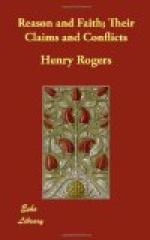the truth be not in the medium of communication rather
than elsewhere; and, indeed, whether the philosopher
be not aiming to communicate thoughts on subjects on
which man can have no thoughts to communicate.
Socrates would add, perhaps, that language was given
us to express, not to conceal our thoughts; and that,
if they cannot be communicated, invaluable as they
doubtless are, we had better keep them to ourselves;
one thing it is clear he would do,—he would
insist on precise defintions. But in truth it
may be more than surmised that the obscurities of
which all complain, except those (and in our day they
are not a few) to whom obscurity is a recommendation,
result from suffering the intellect to speculate in
realms forbidden to its access; into caverns of tremendous
depth and darkness, with nothing better than our own
rushlight. Surely we have reason to suspect as
much when some learned professor, after muttering
his logical incantations, and conjuring with his logical
formulae, surprises you by saying, that he has disposed
of the great mysteries of existence and the universe,
and solved to your entire satisfaction, in his own
curt way, the problems of the absolute and the
infinite! If the cardinal truths of philosophy
and religion hitherto received are doomed to be imperilled
by such speculations, one feels strongly inclined to
pray with the old Homeric hero,—’that
if they must perish, it may be at least in daylight.’
We earnestly counsel the youthful reader to defer
the study of German philosophy, at least till he has
matured and disciplined his mind, and familiarised
himself with the best models of what used to be our
boast—English clearness of thought and expression.
He will then learn to ask rigidly for definitions,
and not rest satisfied with half-meanings—or
no meaning. To the naturally venturous pertinacity
of young metaphysicians, few would be disposed to be
more indulgent than ourselves. From the time
of Plato downwards—who tells us that no
sooner do they ‘taste’ of dialectics than
they are ready to dispute with every body—’sparing
neither father nor mother, scarcely even the lower
animals,’ if they had but a voice to reply.
They have always expected more from metaphysics than
(except as a discipline) they will ever yield.
He elsewhere, still more humorously describes the same
trait. He compares then, to young dogs who are
perpetually snapping at every thing about them:—Hoimai
gar se ou lelethenai, hoti hoi meirakiskoi, hotan
to proton logon geuontai, os paidia autois katachrontai,
aei eis antilogian chromenoi kai mimoumenoi tous exelenchontas
autoi allous elenchousi, chairontes osper skulakia
te kai sparattein tous plesion aei. But we hope
we shall not see our metaphysical ‘puppies’
amusing themselves—as so many ‘old
dogs’ amongst neighbours (who ought to have
known better) have done,—by tearing into
tatters the sacred leaves of that volume, which contains
what is better than all their philosophy.




